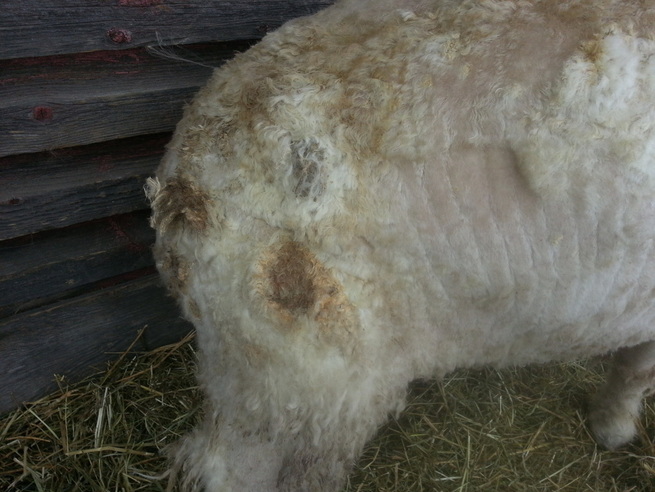
The cost to spay a pup is around $350 and to neuter a male, just a little less. At this point, the female dogs on the farm are spayed and so is the border collie, but Ofcharka and Harley, the livestock guardians, are not neutered. It is a matter of money availability. They all need rabies vaccinations, but at $90 dollars a shot, plus all must be carted to the veterinarian's office because he is not licensed to do the rabies shot on the farm, it is another money concern.
The photo is the Costwold ram, Walter, on the day he was sheared. Walter had some sort of ruptured abscesses. There were randomly located on his body in no particular order and were oozing fluid. They began to heal on their own, but shortly thereafter, he developed another under his chin, which ruptured and stunk like rotting meat. The vet was already here to see Walter initially, took stool samples and did a quick examination. It turned out he had some worms, not a bad case, but the vet felt he should be treated for them. Before the sheep are turned out to pasture, which is late this year, they are wormed on the Famacha
system. The lower eye is examined for colour quality from red to white. White is anemic at the point of no recovery and reddish is healthy. Light pink requires treatment, but red does not. I would like to switch to garlic and diatomaceous earth as a preventative for worms, rather than continue with chemical wormers, but this time they will be treated with Safeguard.
Walter was treated, but when the chin abscess ruptured, a suspicion of CL (caseous lymphandenitis) was suspected so the vet came again and took a sample of the discharge. The cost for the two visits for Walter was $805. He did not have CL, just a staphylococcus infection treatable with penicillin, which I had in the fridge and was able to administer on my own, thank goodness.
And therein lies the dilemma. The value of the Cotswold ram is $450. With his medical treatment, he is now a $1200 dollar ram. If he was not a rare breed, halter trained and exceptional as a ram, it would not have been prudent to have the vet treat him at all. In hindsight, maybe it was not the best decision to spend the $805 to diagnose his problem, but, as farmers, we want to do what we can to help our animals. Economically speaking, it is not viable to spend these thousands of dollars on the animals though, since their worth will never equal the value of the veterinarian's bills. Now I full understand why old time farmer's took sick animals out behind the barn and shot them, drowned unwanted kittens and puppies and learned to castrate animals themselves. Yes, it is not so humane, but when there is no money to pay the exorbitant vet bills, and the farmer does not want to go broke, what choice is there?

 RSS Feed
RSS Feed